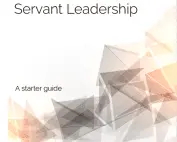Develop transformational interpersonal skills
Have you ever admired someone who effortlessly worked a room, charming every person they encountered? We often call such an individual a people person or describe them as a brilliant conversationalist. It seems so natural when you view it from afar, but charisma can be learned. Sharpening your interpersonal skills can make you the most unforgettable person in the room.
0 1
What are interpersonal skills?
Interpersonal skills are the social skills we have for communicating, connecting, and working with others. They include effective speaking and listening as well as self-management and emotional intelligence. They are also sometimes referred to as employability skills because they are the abilities that separate candidates beyond qualifications and experience when a hiring manager is considering you for a job.
Unless you are a professional hermit, your job likely requires you to interact with people. They might be customers, suppliers, colleagues, employees, or industry cohorts. We often spend more time with our workmates than our spouses or partners, and our ability to engage productively with them, even when resolving conflict, directly impacts company morale and our individual performance
Many executives think their Ivy League credentials or years of experience speak for their ability to lead, but a recent article in Inc magazine highlighted 5 bad leadership traits and 4 of them were due to a lack of interpersonal skills. Even at the C-level, your ability to communicate, connect, and collaborate means more to your long-term success than the diploma hanging on your wall.
According to Forbes, an effective business leader should be able to:
Connect
- Strike up conversations and connect with colleagues at every level of the company. Find common ground and develop both formal and informal relationships.
- Recognize people when they perform well. Empower them by highlighting their achievements and support their willingness to push themselves and try new approaches.
Communicate
- Listen attentively to what people say. Ask questions and solicit input. Give people room to speak and welcome their ideas and opinions.
- Be aware of nonverbal communication such as tone of voice, body language, facial expressions, and more.
Collaborate
- Look for opportunities to bring people together who possess complementary skills. Support good teamwork within the organization. Encourage collaboration.
- Commit to a team project and stay committed. Saying yes and then canceling later erodes trust.
Prefer to listen?
Be that leader who owns the room
“The most important thing in communication is to hear what isn’t being said.” — Peter Drucker
0 2
How to communicate like a pro
Productive communication starts with Active Listening. When we actively listen, we remove distractions, open our minds, and give someone our full attention. Our attuned focus allows us to establish the connection that cues us into what people are saying with their words, tone, and bodies. Pay particular attention to someone’s nonverbal and paraverbal communication because these account for up to 93% of communication.
Nonverbal Communication: We communicate with our facial expressions, eye contact, posture, gestures, and body position to emphasize, contradict, question, and otherwise modify what we say.
Paraverbal Communication: We communicate with the pitch, tone, and pace of our speech. We raise our voices and use inflection to reinforce and modify our words. Paraverbal is not what we say, but how we say it.
We can bolster our active listening skills with a few simple tricks. Fast Company recommends doing away with the assumptions we might have about the person we’re talking to and begin with an open mind. Set aside bias and just listen
Often, we approach a conversation with thoughts of what we want to get out of it. Put that aside as well. Address the other person’s priorities, ideas, or agenda items first. Doing so makes people feel comfortable. In turn, they feel better about engaging more openly with you, which engenders an atmosphere of collaboration.
An effective communicator is also attuned to their own nonverbal signals. When we actively listen, we take in the full spectrum of what’s being communicated, said and unsaid, by all the parties involved.
As a leader in your office, your communication role boils down to social awareness and actively listening. According to Psychology Today, a good listener gives their conversation partner a ‘feeling as if they had a good “connection” with him or her.’ Your ability to connect is predicated upon your strong interpersonal skills, and connections translate to engagement. Studies show an engaged workforce is 17% more productive than their peers.
Thus, your ability to hold a conversation with your team can directly translate to your bottom line. That’s a big return for a little small talk.
So, how can you become a better conversationalist?
“The most important persuasion tool you have in your arsenal is your integrity.” – Zig Ziglar
0 3
Building rapport and making small talk
The number one rule of conversation is to know your audience. Who are you speaking to and what are their values?
Reading a room is a handy skill whether it’s a boardroom, industry conference hall, or the holiday party. Take the temperature of the room and have an understanding of:
- Why are people gathered?
- Who is present?
- What are their expectations?
- What common interests are shared by the room?
Before you speak, take a moment to quickly observe your conversation partner. What do you know about them? What is their posture? Be tactful of how they speak. Are they formal? Do they use slang? Be emotionally intelligent. Each conversation is its own game with unique rules about what’s expected and makes it engaging.
Here are some simple tips for building a connection and establishing rapport:
- Find common interests
- Listen more than your speak
- Ask follow-up questions when someone speaks
- Mirror a person’s body language
- Give genuine compliments and positive feedback
- Know when to stay silent
- Use gestures and body language for emphasis
- Keep your toes and torso facing the other person
- Demonstrate a positive attitude
- Don’t be afraid to smile
If you feel as if you’re building rapport, notice their nonverbal signals. Practice active listening. Pay attention if they are nodding their head. Are they smiling back at you? Understanding the things people don’t say informs what you should say next.
Depending on the situation, you may need to make small talk. While many people dismiss small talk as empty babbling, it is a proven means of establishing trust. It can elicit deeper conversations and is a shortcut to building rapport.
Small talk is actually a skill, and if you haven’t practiced, it can be awkward. The website Real Simple gives us 10 Tips for Making Small Talk Less Awkward:
- Have a few small-talk questions up your sleeve so you have something interesting to share and build good rapport.
- Scan newspaper headlines and movie and book reviews for conversational snippets.
- Focus on Learning New Names.
- Provide details and embellish responses to give the other person something to work with.
- Listen more than you talk.
- Comment on the setting, the music, the decor, or the weather.
- Don’t panic when there’s a lull in the conversation. Silence is transition.
- Introduce people and offer a piece of information about them when you do to facilitate conversation.
- Be aware of different personalities and recognize when someone is being less than friendly.
- Remember the Magic Words: “I Need” — ‘I need to talk to a client over there. I need to meet the speaker.’ Feel free to move on to other conversations as needed.
Good interpersonal skills are all about how we get on with the people around us, how we engage with them, and what kind of influence we have with them. Mastering your interpersonal skills makes you a more charismatic person and the kind of individual people view as a natural leader.
Key Takeaways
- Interpersonal skills are the skills required to effectively communicate, interact, and work with individuals and groups.
- Interpersonal skills can be learned, practiced, and developed.
- These skills are often valued as much as hard skills and qualifications.
- Building rapport and engaging in small talk are things we can prepare for in advance of events and meetings.
- Listening is key to all interpersonal skills.
Common Questions
Forbes recently published a list of how people behave when they disconnect:
- They look around the room
- They avoid eye contact
- They stare at their Phone
- They talk too fast
- They don’t respond verbally or nonverbally
- They fold their arms or legs
- They furrow their brow
- They slump in their chair
According to the website College Info Geek, there are four easy tactics to remembering names:
- Realize Names Aren’t Easy to Remember — Recognize that names are difficult to remember, and you’ll naturally put more effort into remembering them.
- Use the Person’s Name in Conversation — When you repeat someone’s name, you’re engaging the parts of your brain required to speak it, resulting in new neural pathways, which improve your recall. Use the person’s name more than once in the conversation to make this technique more effective.
- Use a Mnemonic Device — link the person’s name to something else that is easily retrievable. A mnemonic can be anything from an acronym to a rhyme to a ridiculous story. For example, if you met someone named “Avery,” you could think of a word that rhymes with their name, bravery, and remember them as brave for their choice of drink or showing up to the party alone, etc.
- Admit Defeat — if you forget someone’s name, admit it, and ask again. People will understand.
7 Ways to Be a Better Listener from Smart Company
- Look at how they feel — Notice the tell-tale signs right in front of you — the sad eyes, the annoyed grimace, the eyes rolling skyward, the continual swallowing.
- Listen to their speech — Listen to the vocal inflections and pace of speaking. Always make allowances for both what and how people are speaking.
- Get rid of distractions — Give people your time and focused attention.
- Avoid going your way — Don’t interrupt and divert a conversation based on a thought you’ve had or something you’ve been waiting to address. Hold off until the speaker is finished.
- Turn off selective hearing — Be respectful and pay attention to all that is said, not just what you find interesting.
- No unsolicited quick fixes — Don’t offer answers that trivialize what is being said. Don’t assume your pithy solutions are right for everyone.
- Be patient — Make sure you understand the gist of what’s being said before jumping in with your take.
This is one of our executive briefings taken from our series of professional online business short courses from ELL. We have over 100 courses online with over 1,000 hours of e-learning covering a wide range of topics across leadership, management and personal & professional development created by industry experts and learning professionals.
Interpersonal Skills Course
Interpersonal skills are one of the most powerful and compelling skillsets to develop in any walk of life, whether in a public facing role or whether you want to improve your overall levels of influence and be the unforgettable person in the room. Our course gives you a set of starter tools to open conversations, move them along and progress your influencing skills.
By the end of this short course on introducing Interpersonal Skills, you will be able to
- Understand how to start and guide conversations
- Make a powerful and positive impact on anyone, anywhere
- Know the basics of professional negotiation skills
In each of our business courses, you get access to around six hours of e-learning that you can watch, listen and read. There are usually 100 questions and at the end of the course you will receive a certificate of completion that you can use against any personal or professional development requirements. As well as the course, you also receive a FREE e-book that you can read on your Kindle or other e-reader. You also get a FREE audiobook of the course so you can listen to the whole course uninterrupted on your device.















